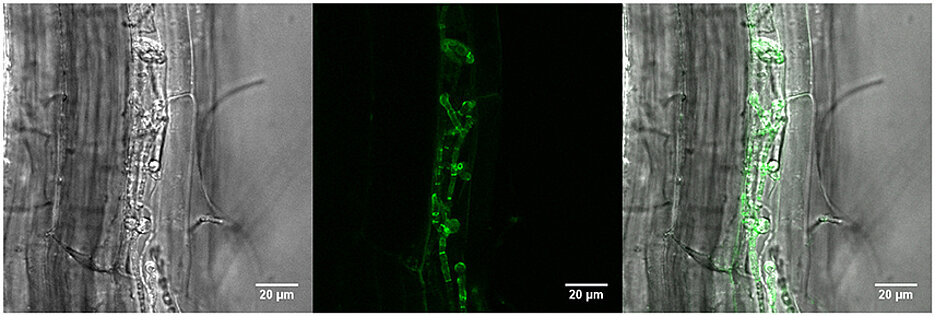How a fungus inhibits the immune system of plants
10/27/2016A newly discovered protein from a fungus is able to suppress the innate immune system of plants. This has been reported by research teams from Cologne and Würzburg in the journal "Nature Communications".

The fungus Piriformospora indica colonizes the roots of different plants. This can be orchids, tobacco, barley or even moss. It penetrates into the roots, but does not damage the plants. On the contrary, it can even promote the growth of its plant partners. Such and other interactions between the fungus and its partners are already known to the scientific community.
Research groups from Cologne and Würzburg are now reporting a new facet of the fungus-plant relationship in "Nature Communications": The researchers identified a protein with which the fungus suppresses the immune defence of the populated plants. So it makes sure that it is not attacked like disease-inducing fungi and the relationship can succeed in the long run.
The protein "Fungal Glucan Binding 1" (FGB1) causes, inter alia, the plant not to produce an "oxidative burst". This usually generates aggressive oxygen radicals, which destroy potential pathogens and activate the immune system of the plant.
Protein makes the plant blind to fungus structures
How does the protein lame the immune response of the plant? "It binds highly affine and very specific to sugar molecules that sit in the cell wall of the fungi and which are normally recognized as 'foreign' by the plant," explains Professor of Molecular Biology Alga Zuccaro from the University of Cologne. FGB1 acts like a camouflage coat and conceals the foreign sugar molecules from the immune system.
The relevant sugar molecules are beta-1,3 / 1,6-glucans, according to Jürgen Seibel, a professor of Organic Chemistry at the Julius-Maximilians-Universität (JMU) Würzburg. The fact that fungal glucans have a positive effect on human immune systems has been known for a long time. It is less known that they can also stimulate the immune system of plants.
The fact that the immune defence is suppressed by FGB1 in the case of Piriformospora indica, Zuccaro and Seibel can now demonstrate by combining the know-how of their working groups. The Cologne molecular biologist is an expert on root-colonizing fungi and the plant immune system, the Würzburg chemist is a specialist for sugar molecules and their functions in cells and organisms.
Perspective for medical diagnostics
The new findings may be useful in medicine and plant breeding. Given that the newly discovered protein FGB1 has such a high affinity and specificity to beta-1,6-glucans from fungi cell walls, it is possibly suitable for the diagnosis of human infections. In addition, the new knowledge could contribute to the cultivation of plants with increased disease resistance in the long term.
The next step is to examine how the plants recognize the beta-1,3 / 1,6-glucans and how exactly FGB1 suppresses them.
The fungal-specific ß-glucan-binding lectin FGB1 alters cell-wall composition and suppresses glucan-triggered immunity in plants. Stephan Wawra, Philipp Fesel, Heidi Widmer, Malte Timm, Jürgen Seibel, Lisa Leson, Leona Kesseler, Robin Nostadt, Magdalena Hilbert, Gregor Langen & Alga Zuccaro, Nature Communications, 27. October 2016, DOI:10.1038/ncomms13188
Contact
Prof. Dr. Alga Zuccaro, University of Cologne, T +49 221 470-7170, azuccaro@uni-koeln.de
Prof. Dr. Jürgen Seibel, University of Würzburg, T +49 931 31-85326, seibel@chemie.uni-wuerzburg.de






